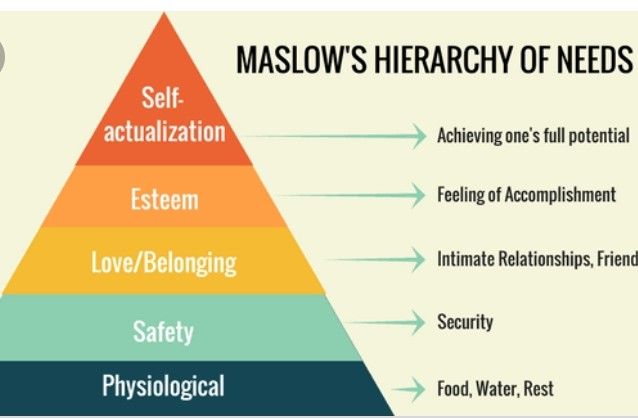The Hierarchy Of Needs
May 07, 2019 • 37 views

Abraham Maslow in 1968, postulated a hierarchy of five needs that were crucial in activating and directing human behavior. These include physiological, safety belongingness and love, esteem and self actualization needs. He termed these needs as instinctoid needs, meaning that each need had a component of hereditary. Maslow states that, we are already equipped with these needs at birth but we learn behaviors to satisfy these needs, therefore these needs differ from person to person.
These needs are arranged in a hierarchy, from the strongest to the weakest. Lower needs have to be satisfied first before one can pursue the higher needs, because higher needs are not necessary for survival. For example a hungry person will be motivated to find food rather than satisfy his need for esteem.
Physiological Needs: food, water and sex.
These needs are necessary for survival. It not only includes the need for food and water but also the need for clothing and shelter. Maslow also stated that the need for sex is important for the survival of the species and not important for individual survival.
Safety Needs: order, security and stability.
According to Maslow, the need for safety is an important drive for infants and neurotic people. The safety need is usually satisfied in emotionally healthy adults, since this need requires one to be free from fear and anxiety, stable and secure. This needs still impacts a normal adults behavior, this is why we choose to save for the future, buy insurance, choose the predictable over the unknown or choose a stable job.
Belonging And love needs.
Once the physiological and need of safety have been satisfied , the individual moves on to satisfy the need for love and belongingness. This is why we have close relationships with a friend, lover, spouse and even form other social relationships. Maslow also states that, an intimate relationship with someone can satisfy the need to give and receive love. Failure to satisfy the need for love can lead to emotional maladjustment.
Esteem Needs.
Once we have successfully satisfied the previous needs, we are motivated to satisfy the need for esteem. We satisfy this need for ourselves in the form of self worth, and from others in the form of recognition and social status.
Satisfaction of this need helps to increase one’s self-confidence and adequacy, thus, making one more productive and competent. Failure to satisfy the need leaves us feeling inferior , helpless and discouraged.
The self-actualization need
Maslow describes this need as the maximum realization and fulfillment of our true potential and abilities. If a person satisfies all the lower needs and is unable to be self-actualized, he/she will be left feel restless and discontent.
In order to satisfy the need for self-actualization, one must be free from the restrictions imposed by oneself and society. One should have realistic knowledge of their strengths and weaknesses and should not be distracted by lower needs. They should have a secure self-image and relationships with others.
Maslow also states that for some individuals there can be an exception of this order. For example, people who fast until death for the sake of their beliefs and ignore their physiological and safety needs or people throughout history who ignore their security and healthy for the sake of their work.
